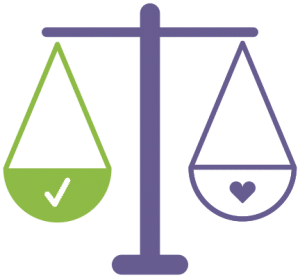The International Coach Federation (ICF) is the world’s largest professional association for professional coaches. From a large number of coaching conversations, an analysis has been set up, which ultimately led to eleven core competences of the professional coach. These eleven core competences of the professional coach have been formulated to clarify which skills and approaches it considers important for practicing the profession of coach. The core competences are grouped into four clusters that form a logical whole. The clusters and the individual competencies within them are not weighed separately. There is no priority in any form. Every competent coach must have all core competencies.
Cluster A. Lay the foundation
Developing a relationship of trust with the client. Understanding of coaching ethics and vision of coaching and the ability to apply it correctly in all coaching situations. Clarifying preconditions. The ability to create a supportive environment that shows respect and confidence.

Competence 1: Shows ethical behavior
The Personal Coach adheres to ethical rules and professional standards and has the ability to apply them correctly. He treats the information discussed in the coaching relationship confidentially. He knows the limits of his own competence and, where necessary, forwards coachees to specialists. (Meeting ethical guidelines and professional standards).

Competence 2: Draws up and maintains agreements
Make clear agreements with the coached person and shape the coaching relationship. The ability to understand what is needed in a specific coaching interaction and to make agreements with the client and/or coachee about the coaching process and the coaching relationship. To be able to delve into the needs of the coachee and respond to them with an appropriate offer, or to reject the request for help with motivation. Make clear agreements about the approach and duration of Personal Coaching and the responsibilities of both coach and coachee. (Establishing the coaching agreement)
Cluster B. Shaping the relationship together
Realizing your own working style, based on vision and skills. The ability to be aware and to create a spontaneous relationship with the client, using a style that is openly flexible and self-aware. It is about authenticity, respect, flexibility and self-insight.

Competence 3: Creates trust and safety
The ability to create a safe, encouraging environment that always involves mutual respect and trust. The ability to create a safe, supportive environment that continuously produces respect and trust. (Establishing trust and intimacy with the coachee).

Competence 4: Have a coaching mindset
Being “present” as a Personal Coach without dominating the other person. The ability to be fully aware and, flexible and confident, to establish a candid relationship with the coachee. Building a coaching relationship with the coachee from a personal authentic style. Dare to take the lead in the relationship with confidence and decisiveness without undermining the coachee’s own responsibility. (Coaching presence).
Cluster C. Communicate effectively
Communicate effectively (listening, asking questions, empathy, confronting, reframing). The ability to focus on what the client says and does not say, understand its meaning in the context of the client’s learning questions and support him in self-expression.

Competence 5: Listens actively
The ability to pick up all signals (verbal and non-verbal) that the coachee sends out. Empathize with others. Sensing emotional signals. Total receptivity when listening; attuning to one person. Understanding the thoughts, feelings and intentions of another. The ability to fully focus on what the coachee says and does not say and to understand what is said within the context of the coachee’s wishes; the ability to promote that the coachee expresses himself. (Active listening).

Competence 6: Stays involved
Use language that the coachee understands. Do not wrap around the hot paste. Dare to confront while maintaining respect in the relationship. The ability to communicate effectively during coaching sessions and to use language that has maximum positive impact on the coachee. (Direct communication)
Cluster D. Promote the learning process and achieve results
Creating awareness and learning ability. The ability to integrate and accurately evaluate various sources of information, to make interpretations that help the client to become aware and to take responsibility for achieving the agreed results. The ability to create opportunities for continuous learning with the client. Coaching results. The ability to develop and monitor an effective coaching plan with the client. Process control from start to finish. The ability to focus on what is important to the client and to leave the responsibility for taking action on the client.

Competence 7: Inspires awareness
Increase awareness of the coached person. Focus the coachee’s attention. Encourage him to reflect and generate his own solutions. Stretch the frame of reference of the coachee by choosing surprising perspectives. Helps coachees discover for themselves what new thoughts, beliefs, perceptions, emotions, moods, etc. that strengthen them in their ability to take action and achieve what is important to them. (Creating awareness).

Competence 8: Facilitates client growth
Action orientation. The ability to design appropriate actions together with the coachee to achieve the desired result. Creating opportunities together with the coachee to continue to learn, during coaching and in daily life, and to take new actions that most effectively lead to the agreed coaching objectives. (Designing actions)
Facilitates client growth
Making the tension between goal and current reality constructive. Formulate objectives and plans. The ability to direct the coachee’s attention to the future and to convince him that tension between the here and now and the desired future is necessary to bring about changes. Coaches who continue to roll around in their problems dare to confront and sometimes try to get out of their regular patterns with firm interventions. The ability to establish and adhere to an effective coaching plan with the coachee. (Planning and goal setting)
Facilitates client growth
Promote the taking of responsibility by the coached person. The ability to focus on what is important to the coachee and to leave the responsibility for taking action with the coachee, without abandoning him. Stimulating the self-discipline of the coachee. (Managing progress and accountability)
For more information about the International Coach Federation, visit www.coachfederation.org.
The above competences are used as the basis for the assessment in the ICF certification procedure.